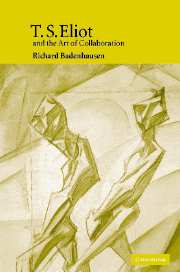Book contents
- Frontmatter
- Contents
- Acknowledgments
- List of abbreviations
- Introduction – Reaching the stillness of music
- 1 “Speaking as ourselves”: Authorship, impersonality, and the creative process in the early essays
- 2 A conversation about “the longest poem in the English langwidge”: Pound, Eliot, and The Waste Land
- 3 “Helping the poets … write for the theatre”: The transitional essays on collaboration, community, and drama
- 4 A dramatist and his midwives: Eliot's collaborations in the theatre
- 5 The Possum and the “creating critick”: Eliot's collaboration with John Hayward
- Conclusion – Placing collaboration in perspective: Voice and influence in the late essays
- Notes
- Index
5 - The Possum and the “creating critick”: Eliot's collaboration with John Hayward
Published online by Cambridge University Press: 22 September 2009
- Frontmatter
- Contents
- Acknowledgments
- List of abbreviations
- Introduction – Reaching the stillness of music
- 1 “Speaking as ourselves”: Authorship, impersonality, and the creative process in the early essays
- 2 A conversation about “the longest poem in the English langwidge”: Pound, Eliot, and The Waste Land
- 3 “Helping the poets … write for the theatre”: The transitional essays on collaboration, community, and drama
- 4 A dramatist and his midwives: Eliot's collaborations in the theatre
- 5 The Possum and the “creating critick”: Eliot's collaboration with John Hayward
- Conclusion – Placing collaboration in perspective: Voice and influence in the late essays
- Notes
- Index
Summary
When Eliot's friend and eventual roommate of over a decade, John Hayward, signed his lengthy letter of 1 August 1941 responding to Eliot's first draft of “Little Gidding,” he chose a rather curious way of doing so: “Love from yr. old creating critick: John” (CFQ 236). That self-characterization follows the lead of Eliot's essays, which conceive of the critical, editorial act as a creative one. Part of Eliot's intent in early collections like The Sacred Wood to reestablish criticism as a professional calling equal in stature to that of creative writing was motivated by the belief that the time had come to offer a counterpoint to the Romantic exaltation of the poet. But that valuation of the critical faculty also arose out of Eliot's conception of the creative process in collaborative terms. He understood that the contributions of auditors had always helped give shape to his work by providing personal encouragement and critical direction. Yet Hayward's self-representation in the 1941 letter is somewhat uncharacteristic, for he usually portrayed himself in modest terms when writing Eliot, tended to downplay his own critical faculties, and elevated the text above the personalities involved in the collaborative discussion. Even in the letter cited above, Hayward begins his comments by calling into question the usefulness of his perceptions: “whatever critical faculty I possess is momentarily distempered by the work it has [had] to do in the past fortnight” (234).
- Type
- Chapter
- Information
- T. S. Eliot and the Art of Collaboration , pp. 165 - 212Publisher: Cambridge University PressPrint publication year: 2005



